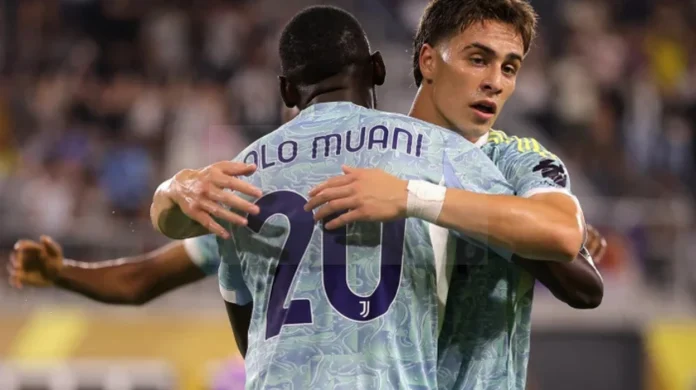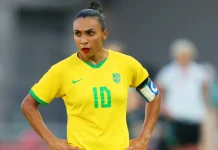At what should have been a routine moment of diplomatic pageantry, silence spoke louder than words. During a high-profile White House visit ahead of the 2025 FIFA Club World Cup, Juventus players were confronted by former U.S. President Donald Trump’s provocative question about gender inclusion in football:
“Could a woman make your team, fellas?”
The players’ choice not to respond—whether out of discomfort, diplomacy, or calculated restraint—became the defining silence heard around the world. This article examines that moment of silence, why it mattered, and how it exposed the tension between politics, sports ethics, and the global struggle for gender inclusion.
Juventus’ White House Visit
On June 17, 2025, Juventus’ men’s squad was welcomed to the White House in Washington, D.C., ahead of their Club World Cup opener against Al Ain. The event was intended as a diplomatic gesture and a celebration of Juventus’ recent successes. However, the mood shifted dramatically when Donald Trump posed a direct and controversial question to the players: “Could a woman make your team, fellas?” The players, caught off guard, responded with silence.
Trump’s Follow-Up and Context
Unfazed by the lack of response, Trump pressed further, stating,
“But they should be playing with women. He’s being very diplomatic,”
referencing Juventus General Manager Damien Comolli’s attempt to highlight the club’s successful women’s team. Trump’s remarks were not made in a vacuum; they followed his February 2025 executive order banning transgender participants from women’s sports and his calls for the International Olympic Committee to revise eligibility rules.
What Was Donald Trump Really Trying to Prove with His Juventus Gender Challenge?
Trump’s statements at the White House were consistent with his broader political agenda. By asking if a woman could make the Juventus men’s team and then insisting women should compete only with women, Trump reinforced his administration’s stance on gender segregation in sports. His executive order earlier in the year had already banned transgender athletes from competing in women’s sports, a move that sparked intense debate and legal challenges.
Did Juventus’ Leadership Choose Diplomacy Over Principle in Responding to Trump?
Juventus General Manager Damien Comolli responded diplomatically, emphasizing the strength of the club’s women’s team, which had recently clinched the 2024–25 Serie A Femminile title. Comolli’s attempt to steer the conversation toward the club’s achievements in women’s football was met with Trump’s insistence on strict gender divisions.
Why Did Juventus Players Stay Silent—and What Did the World Hear Instead?
The players themselves did not respond verbally to Trump’s question. The silence in the room was widely interpreted as discomfort or reluctance to engage in a politically charged debate, especially in such a public and high-stakes setting.
The incident was captured on video and quickly went viral on social media, becoming one of the most talked-about moments leading up to Juventus’ Club World Cup campaign. Media outlets around the world reported on the exchange, highlighting the intersection of sports, gender, and politics. The debate was further fueled by public opinion polls, which showed that approximately 79% of over 2,000 Americans opposed the participation of biological males identifying as women in women’s sports.
The Aftermath: On and Off the Pitch
Juventus’ Club World Cup Performance
Despite the media storm, Juventus maintained focus on the pitch, delivering a commanding 5–0 victory over Al Ain in their opening match. Goals came from Randal Kolo Muani (2), Francisco Conceição (2), and Kenan Yıldız, showcasing the team’s quality and unity. Coach Igor Tudor praised the team’s energy and cohesion, stating, “There was lovely energy between the players. That desire to work hard for one another, to run for one another. We are going in the right direction.”
Ongoing Debate and Policy Impact
Trump’s comments reignited global debates about gender standards in sports, especially regarding the participation of transgender athletes. His executive order and public statements have placed pressure on sports organizations, including FIFA and the International Olympic Committee, to clarify and potentially revise their policies on gender eligibility.
Gender Standards in Sports
The incident underscored the ongoing tension between inclusivity and traditional gender divisions in sports. While some advocate for the full integration of athletes regardless of gender identity, others, like Trump and his supporters, argue for strict biological criteria to preserve fairness in women’s competitions.
The Role of Athletes and Clubs
Juventus’ handling of the situation—choosing not to engage directly with Trump’s provocation—reflects the delicate balance that clubs and athletes must maintain when navigating political controversies. The silence from the players was interpreted by some as a refusal to politicize sport, while others saw it as a missed opportunity to advocate for inclusivity.
Political Influence on International Sport
Trump’s intervention, both through policy and public statements, highlights the growing influence of political leaders on international sport. The FIFA Club World Cup, intended as a celebration of football, became a stage for broader societal debates, demonstrating how sport can both reflect and shape cultural and political values.
The 2025 FIFA Club World Cup was meant to be a showcase of footballing excellence, but Donald Trump’s fearless attack on Juventus’ gender standards transformed it into a global debate on gender, fairness, and the role of politics in sport. The incident at the White House, the reactions from stakeholders, and the ensuing media storm illustrate the complex interplay between sports, society, and policy. As the world continues to grapple with questions of inclusivity and fairness, moments like this will shape the future of both sport and public discourse.













